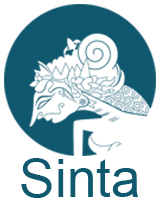PENGARUH TEMPERATUR TUANG TERHADAP POROSITAS, STUKTUR MIKRO DAN KEKERASAN DARI ALUMUNIUM RONGSOK VELG MENGGUNAKAN PENGECORAN EVAPORATIF
Abstract
The second largest metal material used after steel is Aluminum and its alloys. Ranging from aircraft bodies, vehicles, engine components, ship components, to buildings and very diverse applications using aluminum alloys. Material for making alloy wheels for components in motors using one of the special aluminum alloy applications with regard to the strength and hardness of high-quality aluminum alloys. Industrial companies that make aluminum doors, including windows and frames, make aluminum shelves, storefronts and other products. Produce waste remnants of used aluminum which can be used as aluminum as the main material destination. To reduce the company's production costs, many of them use aluminium scrap as their main casting material. Casting uses a temperature of 650 ° C, 700 ° C, 750 ° C, 800 ° C including casting type evaporative or casting using Styrofoam. The missing styrofoam casting pattern is a casting that uses a pattern of material that can evaporate when exposed to molten metal heat. The casting temperature results can affect microstructure, hardness, porosity and structure.
Keywords
Full Text:
PDFReferences
Bahtiar & Soemardji Leo, 2012, “Pengaruh Temperatur Tuang Dan Kandungan Silicon Terhadap Nilai Kekerasan Paduan Al-Si”,Universitas Tadulako
Barone, M. R., Caulk, D. A., 2005, A Foam Ablation Model for Lost Foam Casting Of Alumunium, International Journal of Heat and Mass Transfer, Vol.48, pp. 4132-4149.
Behm, S.U., Gunter, K.L. and Shutherland, J.W., 2003, An Investigation into The Effect of Process Parameter Setting On Air Emission Characteristics In The Lost Foam Casting Process, American Foundry Society.
Brown. J. R., 1992, The Lost Foam Casting process, Metallurgy Material, Vol. 8, pp.550-555.
Firdaus., 2002, “Analisis Parameter Proses Pengecoran Squeeze Terhadap Cacat Porositas Produk Flens Motor Sungai”, Jurnal Teknik Mesin Vol. 4, No. 1, pp. 6 – 12.
DOI: https://doi.org/10.20527/jtam_rotary.v3i2.4119
Refbacks
- There are currently no refbacks.
JTAM ROTARY
Editorial Address
Department of Mechanical Engineering, Engineering Faculty, Lambung Mangkurat University
Jl. Jenderal Achmad Yani Km. 35,5 Banjarbaru Telp. (0511)-4773858 Fax. 0511-4773858.
HP: 0853-3262-2556 (Andy Nugraha) and 0821-5232-0035 (Herry Irawansyah)
E-mail: j[email protected], [email protected], [email protected]
Home Page: http://bit.ly/JurnalRotary

JTAM ROTARY di bawah Lisensi Creative Commons Atribusi 4.0 Internasional.Department of Mechanical Engineering, Engineering Faculty, Universitas Lambung Mangkurat








1.png)
